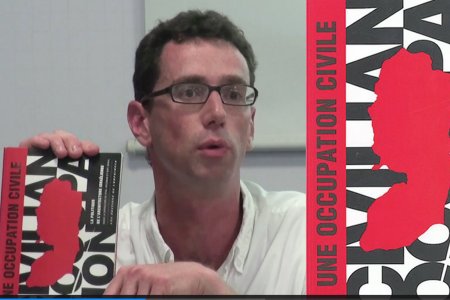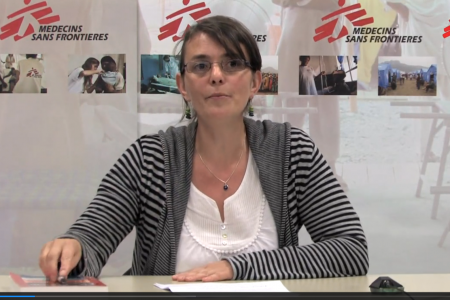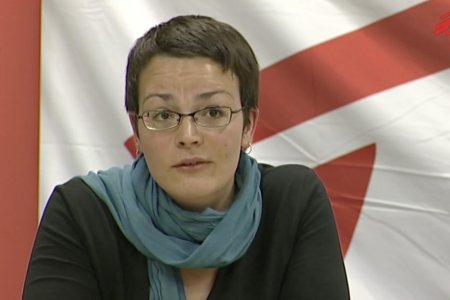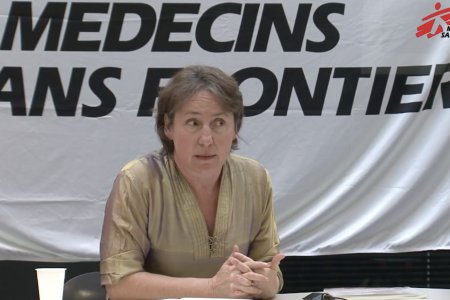
How to improve access to care and aid for people living with a handicap in a humanitarian context?
Benoit Finck
A screening of the film "Agir contre l’exclusion" followed by a debate, April 7th, 2022, at MSF and online. The debate was translated simultaneously into sign language and English. The film, shown as a preview, has been cut from the video: it is available in replay on the France 5 website.
Doctor Jean Dragon, who wrote Les silencieux. Chroniques de vingt ans de médecine avec les sourds (2008),The silent. Chronicles of twenty years of humanitarian medicine with the deaf was the first one to open, in 1995, a reception service in sign language in a hospital in Paris. At that time, in the middle of a HIV pandemic, the health authorities noticed how badly the deaf were isolated. According to Jean Dragon, “deaf people were dying from Aids because they had to call members of their family to translate during consultations. Therefore, they preferred not to see doctors. Or when they saw them and learned their diagnosis, they did not know what Aids was.”https://www.sourds.net/2011/01/10/la-langue-des-signes-veut-entrer-a-lhopital/
Louise Limela is the Coordinator and Facilitator of the OCB association network for Médecins sans Frontières in the Democratic Republic of the Congo. In 2020, she tried to understand to what extent the inhabitants of Kinshasa were informed about the Covid-19 pandemic. She noticed that several groups were excluded because of a lack of information: persons with reduced mobility, the visually impaired, the deaf, people with albinism, widows, and orphans. Louise Limela then started to work with local associations of people with disabilities to train “peer educators”: members of these organisations who were able to reach these persons. As a result of the success of this work and in response to the requests of the beneficiaries she extended her training activities to HIV prevention and family planning. Before the end of 2022, MSF WACA (West & Central Africa) will take over this initiative with the purpose of extending it to its programs in Ituri and North Kivu.
The documentary Agir contre l’exclusion (26 minutes, Point du Jour producer) reports Louise Limela’s work with these groups, with a strong focus on deaf people. It was screened during this CRASH conference and followed by a debate: how to improve access to care and aid for people living with a handicap in a humanitarian context?
Opening:
- Benoît Finck, the film director.
Debate, with the participation of:
- Louise Limela, the Coordinator and Facilitator of the OCB association network in the Democratic Republic of the Congo.
- Patrice Vastel, Coordinator of the international project on the inclusion of people with disabilities at MSF.
- Gregory Keane, Psychiatrist and Mental Health Advisor at MSF.
- Guillaume Le Gallais, director of the I.P.I.D.V. (Initiatives Pour l'Inclusion des Déficients Visuels),Initiatives for the inclusion of the visually impairedformer Operations Director and board member of MSF.
The documentary was broadcast on RTS (April 23th) and France 5 (L'oeil et la main documentary collection, April 25th).
To cite this content :
Benoit Finck, “How to improve access to care and aid for people living with a handicap in a humanitarian context?”, 7 avril 2022, URL : https://msf-crash.org/en/conferences-debates/how-improve-access-care-and-aid-people-living-handicap-humanitarian-context
If you would like to comment on this article, you can find us on social media or contact us here:
ContributePast events
 Conference
Conference
Eyal Weizman - Forensic Architecture at work
02/15/2016 - 07:00 PM 09:30 PMEyal Weizman, the founder of « Forensic Architecture » at the Goldsmiths College (University of London) came to present the project as well as a number of his works at a MSF - Crash conference organised at MSF.
 Conference
Conference
The polio eradication campaign put to test
02/04/2014 - 01:30 PM 07:30 PMThe polio eradication campaign has indeniably and remarkably succeeded in tumbling down the number of polio cases worldwide. But difficulties currently faced by the Programme -pockets of social resistance in several countries, reinfection of some countries, outbreak of epidemics associated with strains of vaccine-derived polio viruses- indeed challenge one of the main assumptions underlying the objective of the eradication itself : the full compliance of an entire population to a public health program.
 Conference
Conference
Living a Natural Disaster
11/03/2010 - 07:00 PM 09:00 PMPeople wandering through the rubble in Haiti, arms outstretched begging for help amid the floods in Pakistan: the media coverage of disasters invariably features helpless victims, overwhelmed by the disaster, waiting to be helped...
 Lena Mucha
Conference
Lena Mucha
Conference
From their point of view
03/10/2009 - 07:00 PM 09:30 PMThe reasons why we are accepted, tolerated or sometimes rejected in the contexts where we work are often obscure. Caroline Abu-Sada and her team of sociology student shed some light on these issues.
 Jacob Zocherman
Conference
Jacob Zocherman
Conference
Grounds for divorce ? MSF and the international criminal court
04/08/2009 - 08:30 PM 10:30 PMIn 1998 MSF decided to support the creation of the International Criminal Court. 10 years later MSF stated that it ‘would not cooperate and would not transmit any information to the ICC'. How can we explain this change of position?
